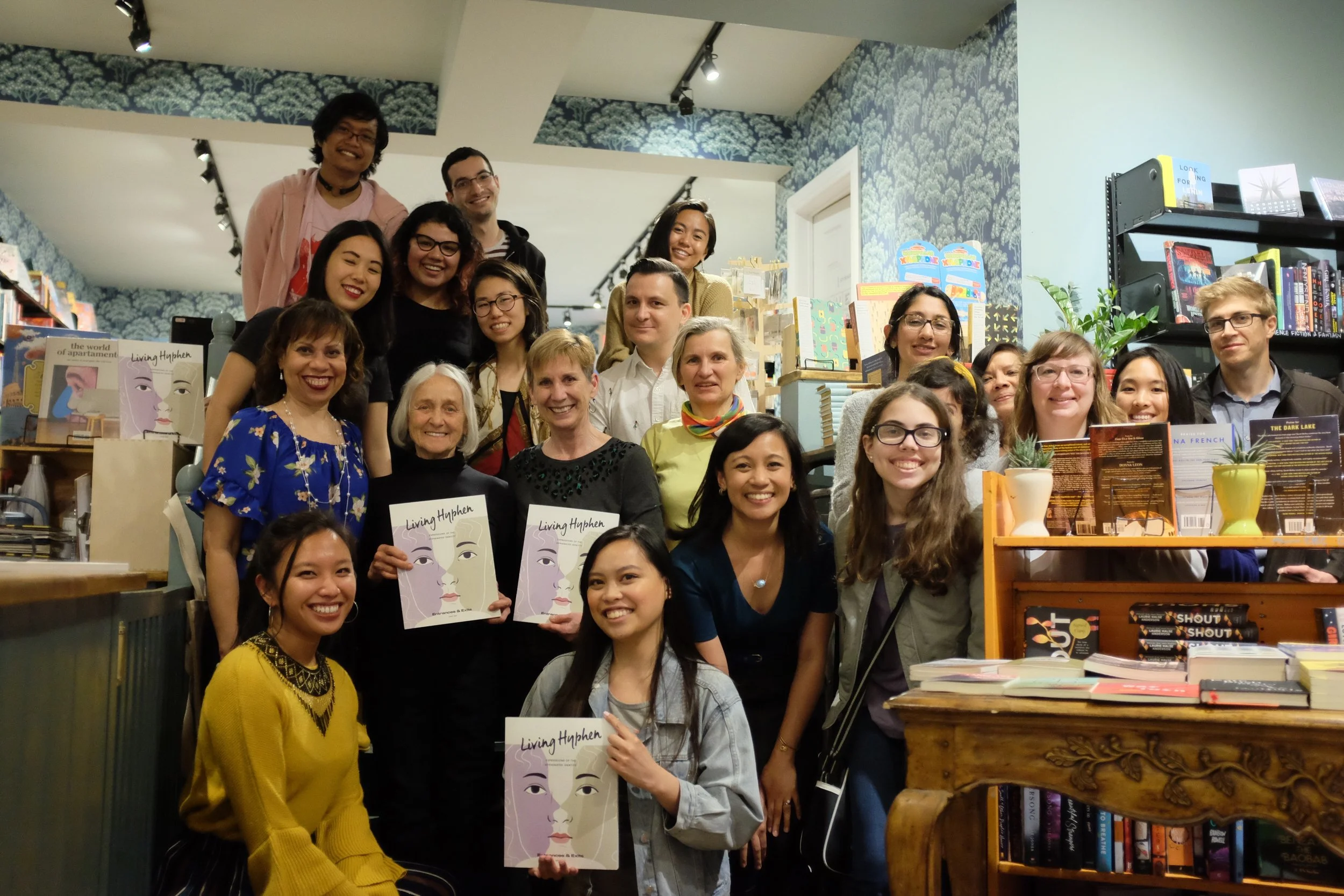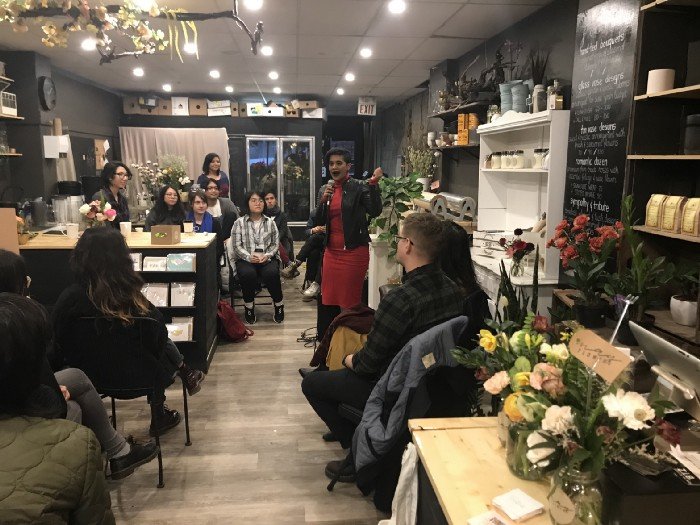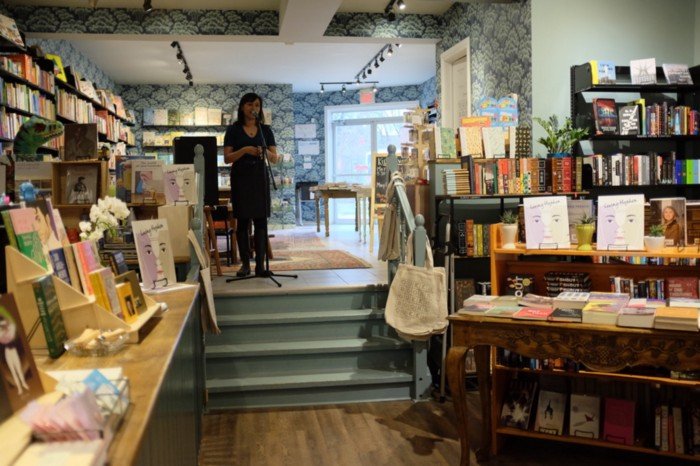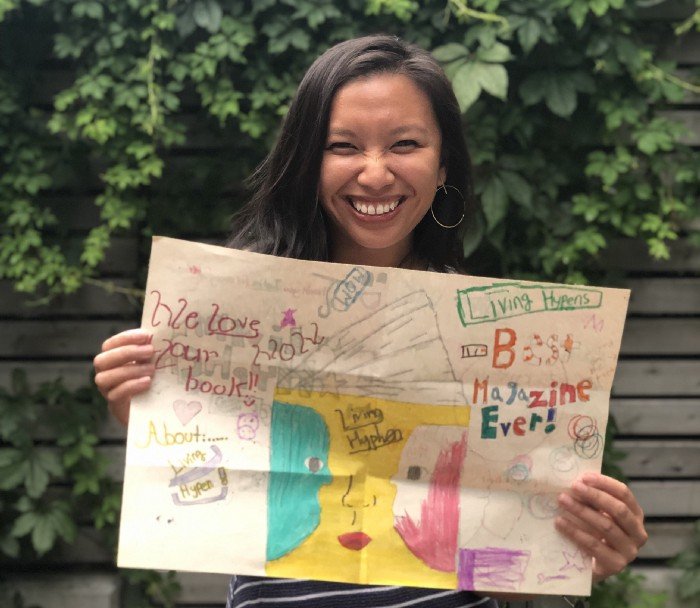This blog was originally published on our Medium blog.
Browse through the “Canadian literature” aisle of any bookstore and you’ll notice a very specific homogeneity in authors’ names. Visit any major art gallery across the country and you’ll find exhibitions that feature primarily white artists. Turn on the TV and, once again, you’ll find homogeneity in the faces represented on screen.
All this in a country that boasts of multiculturalism, where millions of people claim over 250 distinct ethnic origins, and where “diversity is our strength”.
Living Hyphen was born out of this glaring lack of representation. Living Hyphen was born as an attempt to fill this massive gap in Canadian arts and literature.
And the overwhelming response since starting this journey has made abundantly clear to me how important this work is. It has made abundantly clear that there is a hunger, a ravenousness, a very real voracity for these stories.
Since first publicizing our call for submissions in late 2017, we received over two hundred submissions from writers and artists all across Canada who expressed excitement over this rare space for marginalized voices. Upon launching our inaugural issue a year later in October 2018, we sold out our first print run within a single month. We’ve since reprinted and secured distribution in over 20 bookstores across both Canada and the United States.
But those are just the numbers.
Photo by Jennilee Austria.
I have personally received a continuous stream of messages from readers all across the country (and even across the border!) expressing their gratitude and joy in finally seeing themselves reflected in the media. So many people have written in to say that they have been yearning for something like Living Hyphen for so long. And a precious few have even gone on to share their deeply personal stories of navigating identity, home, migration, and belonging as a way to give their thanks. It has been incredibly nourishing and validating.
But there is still something missing.
Throughout these last few months post-launch, I am finding that the magazine, as incredible a success and as important a piece of work as it is, has not been enough.
After spending some time in the arts and literary scene in Toronto, I’m noticing that I am running into the same people, the same artists, the same writers — many of whom submitted their work to Living Hyphen. I am quickly learning that there is a very small and tight-knit circle of creatives here. And I don’t doubt that the same is true across all of Canada.
And though I am extremely proud to know these people and I am deeply grateful for their work in pushing diverse voices into more mainstream spaces, I can’t help but think about the countless other voices out there that are never heard, the stories out there that never see the light of day. Surely there must be more artists and writers from diverse backgrounds than the ones that I see in repeat rotation at the arts and culture events that I’ve been attending.
Earlier this year on a very cold and frigid March night, I hosted Living Hyphen’s first-ever storytelling event — all thanks to funding from TakingITGlobal’s #RisingYouth Community Service grants and in collaboration with May Flowers, a small and beautifully intimate flower shop and café in Toronto’s St. Clair West neighbourhood. I didn’t know what to expect. I didn’t know who (if anyone) would come. I’d never run an event like this before.
To my relief and delight, the night was nothing short of magical.
Open mic night at May Flowers.
A few of Living Hyphen’s contributors were there to share their work and get the crowd warmed up with their powerful stories. Our contributors are mostly emerging and experienced writers — not quite “established” yet as they’d say in the arts and literary scene, but they’re certainly not “amateur” either.
But there were so many others who showed up who were “amateur” — who had never shared their experiences as hyphenated Canadians out loud before, who had never spoken aloud their stories, their poetry, their reflections. And if you asked anyone who was there, I’m sure they would tell you that the experience was transcendent.
The night ended with one attendee speaking through her tears sharing her own experience as a Korean-Canadian struggling to find community after moving from bustling Seoul, South Korea to the small town of Vernon, British Columbia. She said that she had no intention of sharing her story that night but found the courage to speak after hearing so many others go before her and after feeling the support of everyone in that room.
It was in that moment that I realized that what is missing goes far deeper than just a publication or a platform for these diverse voices. What we lack — particularly in marginalized communities—is a CULTURE that encourages our storytelling.
I have had so many hyphenated Canadians, specifically Black, Indigenous, and People of Colour, who have reached out to me to express the shame, the discomfort, the timidity, and the doubt that they have felt in sharing their lived experiences. So many have spoken to me about having to quiet parts of themselves to fit into the mold that they have seen in the media they’ve consumed all their lives.
Black, Indigenous, and People of Colour have been told from their earliest days by the institutions and influences around them that their stories don’t matter, that their stories are not worth listening to, are not valid, are not Canadian enough, are not X ethnicity enough, are not, are not, are not.
And so those stories are left not only unheard, they are left entirely untold.
Moving Beyond Representation, Moving Towards Cultivation
Representation matters, yes. We need to see ourselves in the media that we consume to even be able to imagine ourselves in experiences. We need to see ourselves in the media that we consume to aspire for opportunities greater than what may be available in our immediate world. But more than representation, we need programming, resources, funding, and mentorship to turn that imagining into action and into reality.
It’s taken me a while to realize this but I’ve stalled on Issue 2 for this very reason.
Aside from focusing on securing distribution in bookstores across the country (more on that another time), Living Hyphen’s energy has shifted slightly in these last few months to creating programming where hyphenated Canadians feel compelled and confident to share their stories.
Artwork created by Grade 4 students from Brampton, Ontario after a Living Hyphen talk about the importance of sharing our stories as hyphenated Canadians.
Since March, we have hosted at least one event every month to encourage those from marginalized communities to share their lived experiences. From a writing workshop for BIPOC youth in collaboration with Firefly Writing Studios to our storytelling event at Queen Books, from a Filipina-focused writing circle in Montréal to outreach talks with Grade 4 students in Brampton, we have been working on a grassroots level to create this change.
And we are continuing in this direction in the coming months.
Readings from our co-hosted event with Pluma, a collective of Filipinx-Canadian writers, at Another Story Bookshop. Photo by Jennilee Austria.
The wonderful artists and writers who submitted their work to Living Hyphen are those who have the confidence and the know-how to share their stories with the wider world. They are the ones representing, so to speak.
But what about those who haven’t yet felt ready to share their stories? They are integral too. And so we have been and will continue to nurture these raw and precious voices.
At Living Hyphen, we want to go deeper than representation and move towards truly cultivating these diverse voices, in the true sense of that word — by creating an inclusive space and supportive community. Perhaps one day we may also go further to provide tools, resources, and mentorship to encourage this practice of storytelling.
This isn’t to say that Issue 2 is not coming, but rather that maybe — just maybe — Living Hyphen is becoming more than just a magazine.
On behalf of the very small team at Living Hyphen, I want to thank you for your support and encouragement throughout this journey as we discover new directions and forge new paths for ourselves.
Want to support Living Hyphen in becoming financially sustainable while also maintaining artistic independence? Support us on Patreon today!








